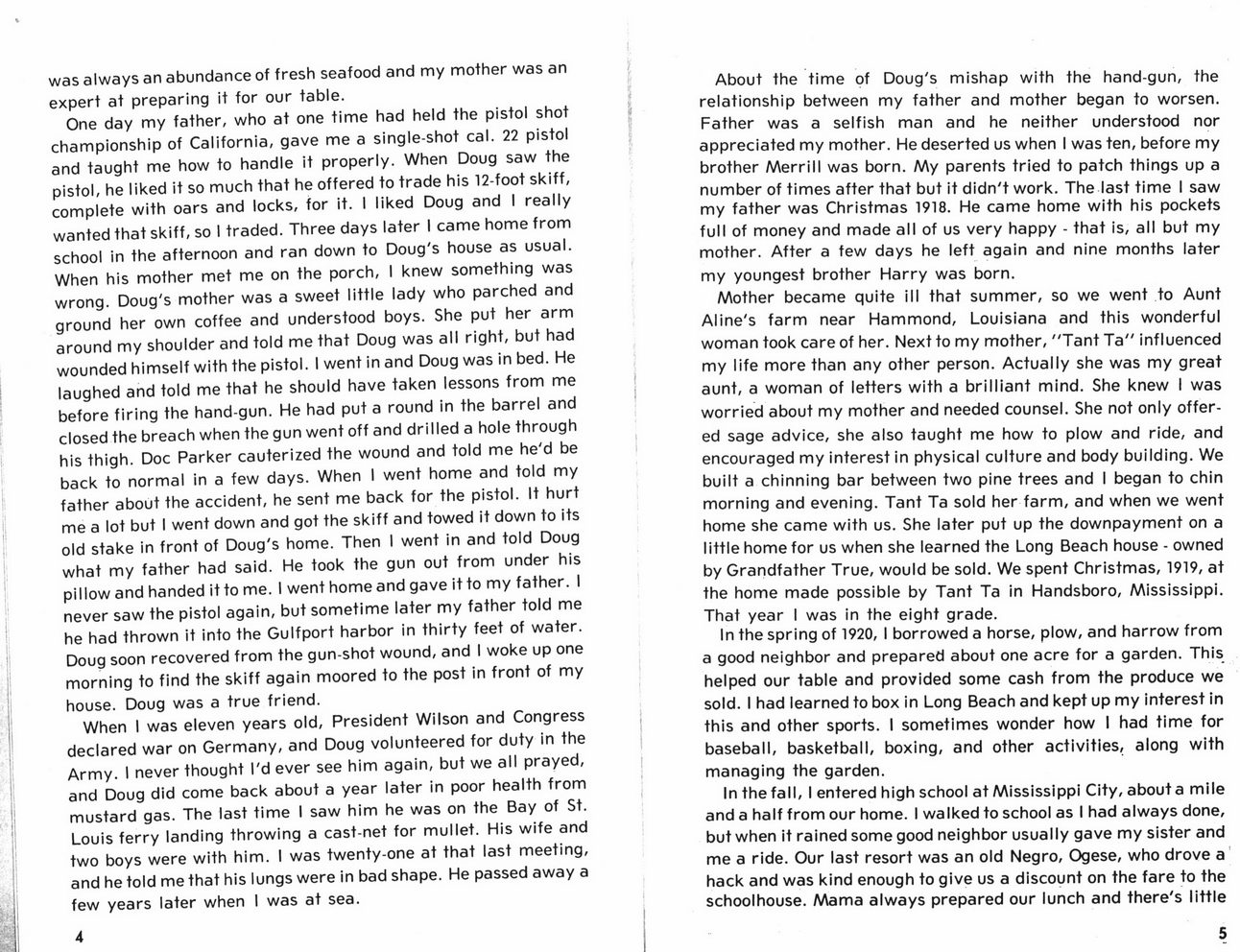This text was obtained via automated optical character recognition.
It has not been edited and may therefore contain several errors.
was always an abundance of fresh seafood and my mother was an expert at preparing it for our table. One day my father, who at one time had held the pistol shot championship of California, gave me a single-shot cal. 22 pistol and taught me how to handle it properly. When Doug saw the pistol, he liked it so much that he offered to trade his 12-foot skiff, complete with oars and locks, for it. I liked Doug and I really wanted that skiff, so I traded. Three days later I came home from school in the afternoon and ran down to Doug's house as usual. When his mother met me on the porch, I knew something was wrong. Doug's mother was a sweet little lady who parched and ground her own coffee and understood boys. She put her arm around my shoulder and told me that Doug was all right, but had wounded himself with the pistol. I went in and Doug was in bed. He laughed and told me that he should have taken lessons from me before firing the hand gun. He had put a round in the barrel and closed the breach when the gun went off and drilled a hole through his thigh. Doc Parker cauterized the wound and told me he'd be back to normal in a few days. When I went home and told my father about the accident, he sent me back for the pistol. It hurt me a lot but I went down and got the skiff and towed it down to its old stake in front of Doug's home. Then I went in and told Doug what my father had said. He took the gun out from under his pillow and handed it to me. I went home and gave it to my father. I never saw the pistol again, but sometime later my father told me he had thrown it into the Gulfport harbor in thirty feet of water. Doug soon recovered from the gun-shot wound, and I woke up one morning to find the skiff again moored to the post in front of my house. Doug was a true friend. When I was eleven years old, President Wilson and Congress declared war on Germany, and Doug volunteered for duty in the Army. I never thought I'd ever see him again, but we all prayed, and Doug did come back about a year later in poor health from mustard gas. The last time I saw him he was on the Bay of St. Louis ferry landing throwing a cast-net for mullet. His wife and two boys were with him. I was twenty-one at that last meeting, and he told me that his lungs were in bad shape. He passed away a few years later when I was at sea. 4 About the time of Doug's mishap with the hand-gun, the relationship between my father and mother began to worsen. Father was a selfish man and he neither understood nor appreciated my mother. He deserted us when I was ten, before my brother Merrill was born. My parents tried to patch things up a number of times after that but it didn't work. The last time I saw my father was Christmas 1918. He came home with his pockets full of money and made all of us very happy - that is, all but my mother. After a few days he left again and nine months later my youngest brother Harry was born. Mother became quite ill that summer, so we went to Aunt Aline's farm near Hammond, Louisiana and this wonderful woman took care of her. Next to my mother, "Tant Ta" influenced my life more than any other person. Actually she was my great aunt, a woman of letters with a brilliant mind. She knew I was worried about my mother and needed counsel. She not only offered sage advice, she also taught me how to plow and ride, and encouraged my interest in physical culture and body building. We built a chinning bar between two pine trees and I began to chin morning and evening. Tant Ta sold her farm, and when we went home she came with us. She later put up the downpayment on a little home for us when she learned the Long Beach house - owned by Grandfather True, would be sold. We spent Christmas, 1919, at the home made possible by Tant Ta in Handsboro, Mississippi. That year I was in the eight grade. In the spring of 1920, I borrowed a horse, plow, and harrow from a good neighbor and prepared about one acre for a garden. This helped our table and provided some cash from the produce we sold. I had learned to box in Long Beach and kept up my interest in this and other sports. I sometimes wonder how I had time for baseball, basketball, boxing, and other activities, along with managing the garden. In the fall, I entered high school at Mississippi City, about a mile and a half from our home. I walked to school as I had always done, but when it rained some good neighbor usually gave my sister and me a ride. Our last resort was an old Negro, Ogese, who drove a hack and was kind enough to give us a discount on the fare to the schoolhouse. Mama always prepared our lunch and there's little

True, Jim Yours Truly-003